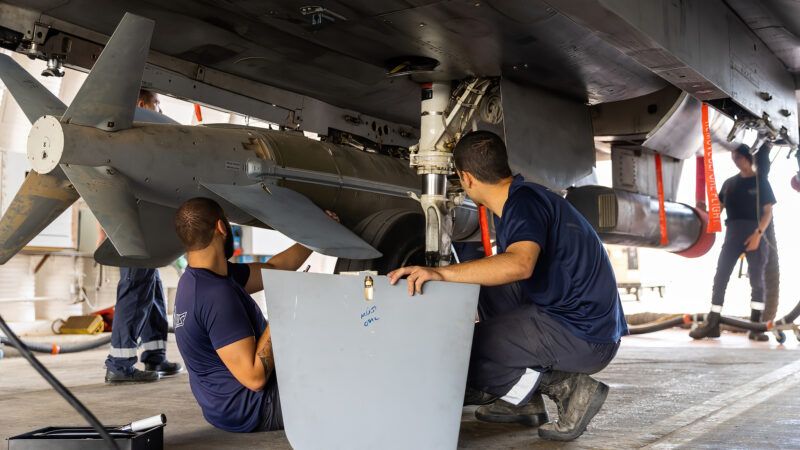Is America's Blank Check for Israel Ending?
President Biden is holding up a shipment of 3,500 bombs to Israel, after months of resisting any conditions on U.S. aid to Israel.

President Joe Biden is holding up a shipment of 3,500 guided bombs to Israel after U.S.-backed negotiations for a ceasefire and an exchange of captives with Gaza broke down. It's the most significant exercise of U.S. leverage over Israel in a long time—and comes after Biden spent months resisting the idea of any limits on how the Israeli military could use American taxpayer aid.
For months, leaks had been coming out of the White House about how frustrated Biden was with the Israeli war effort. At the same time, the Biden administration pushed through weapons shipments to Israel without notifying Congress, reallocated weapons from Ukraine to Israel, rejected any conditions on that aid, and worked to pass several billion dollars in additional funding for Israel.
Last month, the Biden administration was considering cutting off U.S. aid to Israel's Netzah Yehuda Battalion over alleged human rights abuses, including the death of a Palestinian-American retiree in their custody. Under pressure from Israel and Republican leadership, the administration walked back the decision.
This week's Israeli offensive into Rafah, a town in the southern Gaza Strip where around a million Palestinians are sheltering, seems to have changed things. Politico reported on Tuesday morning the Biden administration held up a load of Joint Direct Attack Munitions and Small Diameter Bombs—which was ready for shipment to Israel—in order to send a political message.
Secretary of Defense Lloyd Austin confirmed today that the administration was "reviewing some near-term security assistance shipments in the context of unfolding events in Rafah."
Biden has advised Israel not to invade Rafah without protecting the civilian population. He drew a vague, confusingly-worded red line in a March interview with MSNBC.
"The defense of Israel is still critical, so there's no red line I'm gonna cut off all weapons so they don't have the Iron Dome [missile defense system] to protect them," he said in response to a question about Rafah. "But there's red lines that, if he crosses and they continue—you cannot have 30,000 more Palestinians dead as a consequence of going after—there's other ways to deal, to get to, to deal with, the, with the trauma caused by Hamas."
The Israeli army began its invasion of Rafah after talks with Hamas, which is still holding around a hundred Israeli hostages from the October 7 attacks, broke down. CIA Director Bill Burns was in Egypt supervising the talks.
Hamas had announced on Monday that it had accepted an Egyptian-Qatari proposal to exchange hostages for a ceasefire, under terms similar but not identical to a deal Israel agreed to last month. Israeli Prime Minister Benjamin Netanyahu said the new terms were unacceptable to Israel and the army would go into Rafah directly to retrieve the hostages instead.
Along with any concern with Palestinian lives, Biden might be driven by the sense that his plans to end the war were frustrated and Netanyahu is trying to stick the blame on the Biden administration. After talks broke down, Israeli officials told Axios that they felt like "Israel got played" by the Biden administration. A senior U.S. official responded that "there have been no surprises" from the Americans.
Cutting off the flow of free bombs is a signal that, rather than preferring that Israel do more to protect Palestinian civilians, Washington actually wants the war to end soon.
Still, the Biden administration has been keen to keep any decision-making inside the White House and out of the public's hands. The U.S. State Department was scheduled to report to Congress today on whether the Israeli military complies with international law.
Like the shipment of bombs, that report has been delayed. Biden, it seems, is not ready to share the concerns that drove his decision-making with the public.
CORRECTION: This article originally misstated the CIA director's name.


Show Comments (57)